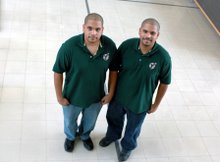There is so much information out there and on the internet about what to do to make your home more energy efficient or green. All this information can bog you down and make it seem impossible, and even too expensive, to become green or energy efficient.
However, having the big picture in mind is important. It will help you prioritize what to do first, based on which projects have the biggest impact and quickest payback. An energy audit and energy rating takes the guess-work out of the process. Having a game plan will not only help you lower your utility bills faster but also help you maximize your comfort level, increase the safety of your home, increase environmental sustainability, achieve energy independence, and leave more cash in the bank.
An energy Rating provides a standardized evaluation (“miles per gallon”) of a home’s energy efficiency and expected energy use costs. The evaluation is conducted in accordance with uniform standards and includes a detailed home energy use assessment, conducted by a state-certified Rater, using an advanced set of nationally accredited energy and economic analysis procedures and verified software tools.
Veterans Energy Solutions, LLC is certified and licensed by the State of Florida and accredited by RESNET to conduct energy audits and energy ratings. You can find out more by reading the Wall Street Journal Article "Energy-Tuning Your Home" by Gwendolyn Bounds.
Here are some of the afformentioned tips:
-Keep air conditioning thermostats at 78 degrees or higher during summer months.
-Use ceiling fans, which allows for setting the thermostat at a higher temperature.
-Use non-essential appliances, such as clothes washers, dryers and dishwashers during off-peak hours (before noon or after 6 p.m.) Wash only full loads of dishes and clothes.
-Close drapes and blinds to keep out direct sunlight during hot weather.
-Avoid using evaporative coolers or humidifiers while an air conditioner is running.
-Run swimming pool equipment for the minimum amount of time and during off-peak hours.
-Limit the opening of refrigerators.
-Reduce hot, outdoor air from entering the house and eliminate the loss of cooled air with
weather stripping and caulking around windows and doors.
-Clean or replace the air conditioner filter regularly to help it run more effectively.
-Check and clean refrigerator coils regularly, especially during the summer. Dirty coils on the back or bottom of the refrigerator can make it work harder than necessary. See appliance owner's manual for maintenance instructions.
-Replace incandescent bulbs with compact fluorescents, which can last up to 10 times longer than old-fashioned bulbs, and produce less heat while using only a quarter of the electricity.
-Turn off lights when leaving a room.
-Use task lighting to directly illuminate work areas.
-Install time clocks or photoelectric cells to control interior and exterior lighting.
-Install dimmer or occupancy switches where appropriate to lower energy consumption.
-Insulate the hot water piping from the water heater to the wall or ceiling pipe penetration. Wrap the tank in an insulating blanket if the water heater's energy factor is less than 0.59.
-Reduce use of all non-essential electric appliances, such as dishwashers and clothes dryers, especially during the late afternoon and early evening. Air-dry dishes instead of using the dishwasher's drying cycle.
-Cook outdoors or use a microwave oven and small appliances like a toaster oven and electric skillet to avoid heating up the kitchen and adding moisture to the air. Microwaves use less than half the power of a conventional oven and cook food in about one-fourth the time.
-Plug home electronics, such as computers, TVs and VCRs, into power strips and turn power strips off when equipment is not in use.
-Lower the thermostat on the hot water heater; 115° is comfortable for most uses.
-Leaking electricity (or phantom loads) from electronics costs Americans about 750 million a year for TVs and about 600 million a year for VCRs. To avoid the leaking of electricity, either unplug electronics when not in use, or plug into a power strip that can be switched off.
-Use as little liquid as possible when cooking - surplus water requires more heating and therefore more gas is used than is necessary.
-When cooking, match the burner to the vessel. Use a small vessel on a small burner. A large burner consumes 15 percent more gas.
Feel free to do-it-yourself, or contact us to take the guess-work out of the process and make your life much easier.
To find more tips and information about greening your home, visit the U.S. Department of Energy’s homepage. The Home Energy Saver Web page will show you how to save energy and save money.
The American Council for an Energy-Efficient Economy has compiled a very helpful resource for consumers to reduce energy consumption.
Wednesday, May 7, 2008
Subscribe to:
Post Comments (Atom)




No comments:
Post a Comment